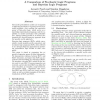Free Online Productivity Tools
i2Speak
i2Symbol
i2OCR
iTex2Img
iWeb2Print
iWeb2Shot
i2Type
iPdf2Split
iPdf2Merge
i2Bopomofo
i2Arabic
i2Style
i2Image
i2PDF
iLatex2Rtf
Sci2ools
106
click to vote
ILP
2000
Springer
2000
Springer
Bayesian Logic Programs
First-order probabilistic models are recognized as efficient frameworks to represent several realworld problems: they combine the expressive power of first-order logic, which serves as a knowledge representation language, and the capability to model uncertainty with probabilities. Among existing models, it is usual to distinguish the domain-frequency approach from the possible-worlds approach. Bayesian logic programs (BLPs, which conveniently encode possible-worlds semantics) and stochastic logic programs (SLPs, often referred to as a domain-frequency approach) are promising probabilistic logic models in their categories. This paper is aimed at comparing the respective expressive power of these frameworks. We demonstrate relations between SLPs' and BLPs' semantics, and argue that SLPs can encode the same knowledge as a subclass of BLPs. We introduce extended SLPs which lift the latter result to any BLP. Converse properties are reviewed, and we show how BLPs can define the sa...
Automated Reasoning | Domain-frequency Approach | Expressive Power | First-order Probabilistic Models | ILP 2000 |
Related Content
| Added | 25 Aug 2010 |
| Updated | 25 Aug 2010 |
| Type | Conference |
| Year | 2000 |
| Where | ILP |
| Authors | Kristian Kersting, Luc De Raedt |
Comments (0)

